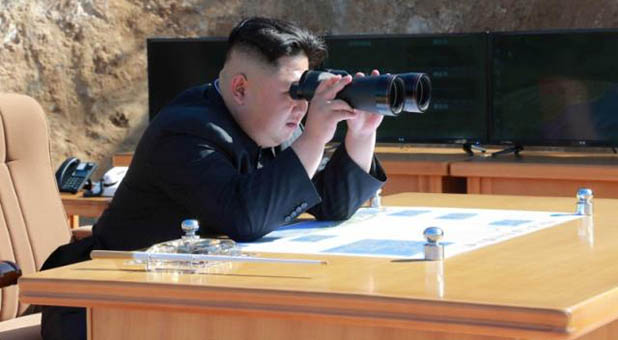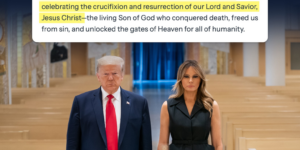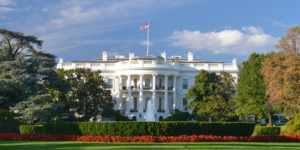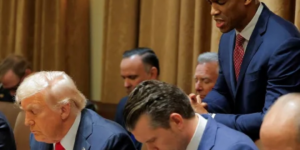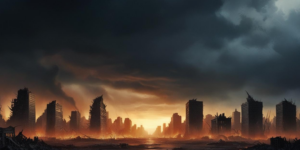North Korea Threatens Nuclear War With U.S.
North Korean dictator Kim Jong-un has taken his dangerous game of chicken with the U.S. to lethal new levels over the past weekend.
With President Donald Trump working with other foreign leaders at the G20 summit in Hamburg, Germany, to secure stricter economic sanctions against the Hermit Kingdom, his diplomatic team is pushing for the same aims at the United Nations in New York City. But in the meantime, the Hermit Kingdom issued a dire threat toward the U.S. and its allies in the Asia-Pacific region.
In an official statement released through the state-run Korean Central News Agency, the North Korean government threatened nuclear war:
A spokesman for the Korea Asia-Pacific Peace Committee in a statement Friday said the U.S. is further resorting to military gambling, losing control of itself, taken aback by the invincible state might and tremendous capabilities of the DPRK.
The U.S. Defense Department is loudly trumpeting about military attack option which, it claimed, worked out at the instructions of Trump on drafting various countermeasure programs to cope with the “north’s provocation”.
Dumbfounded by the DPRK’s successful ICBM test-fire, the U.S. is holding combined ballistic missile demonstration together with the South Korean warmongers, rendering the situation tenser.
This proves that the Trump administration’s claim that it would “not invade but ensure system” is a whopping lie and it is just a trick to cover up its sinister intention to put its war ambition into practice through a surprise attack, the statement says.
Such provocative and dangerous military act shows that the Trump administration’s hostile policy toward the DPRK has reached the extremely reckless phase, it notes, and goes on:
The U.S. should clearly understand that its military attack option is an extremely foolish act of fastening its neck with noose.
It should know that the DPRK has its own-style powerful military option, the one for reducing the U.S. mainland to ashes, to cope with the U.S. military attack option for containing the DPRK by force.
The south Korean authorities can never go scot-free, either, once a war breaks out as they are keen on concealing the U.S. preemptive attack attempt with such words as “dialogue” and “leading role”.
The reckless military attack on the DPRK will be the worst option of accelerating the end of the U.S. and its stooges.
President Trump met with a number of regional leaders on the final day of the G20 summit, including Indonesian President Joko Widodo, Singapore Prime Minister Lee Hsien Loong, Japanese Prime Minister Shinzo Abe, and Chinese President Xi Jinping. In comments made before the latter two meetings, the president made it clear North Korea’s threats were a critical issue.
“I appreciate the things that you have done relevant to the very substantial problem that we all face in North Korea—a problem that something has to be done about,” he said prior to meeting with Xi. “And I’m sure that whether it’s on trade or whether it’s on North Korea, or any of the many things that we will be discussing, we will come to a successful conclusion.”
Success, he added, may take longer than he or others would like, but it will come.
With the help of the United Kingdom and France, the U.S. is putting even more pressure on the United Nations to act. The three countries issued a joint statement in which they declared they would have nothing to do with a resolution on the prohibition of nuclear weapons until the U.N. acts to rein in threats, such as the one posed by North Korea.
The statement specifically names the DPRK:
France, the United Kingdom and the United States have not taken part in the negotiation of the treaty on the prohibition of nuclear weapons. We do not intend to sign, ratify or ever become party to it. Therefore, there will be no change in the legal obligations on our countries with respect to nuclear weapons. For example, we would not accept any claim that this treaty reflects or in any way contributes to the development of customary international law. Importantly, other states possessing nuclear weapons and almost all other states relying on nuclear deterrence have also not taken part in the negotiations.
This initiative clearly disregards the realities of the international security environment. Accession to the ban treaty is incompatible with the policy of nuclear deterrence, which has been essential to keeping the peace in Europe and North Asia for over 70 years. A purported ban on nuclear weapons that does not address the security concerns that continue to make nuclear deterrence necessary cannot result in the elimination of a single nuclear weapon and will not enhance any country’s security, nor international peace and security. It will do the exact opposite by creating even more divisions at a time when the world needs to remain united in the face of growing threats, including those from the DPRK’s ongoing proliferation efforts. This treaty offers no solution to the grave threat posed by North Korea’s nuclear program, nor does it address other security challenges that make nuclear deterrence necessary. A ban treaty also risks undermining the existing international security architecture which contributes to the maintenance of international peace and security.
We reiterate in this regard our continued commitment to the Treaty on the Non-Proliferation of Nuclear Weapons (NPT) and reaffirm our determination to safeguard and further promote its authority, universality and effectiveness. Working towards the shared goal of nuclear disarmament and general and complete disarmament must be done in a way that promotes international peace and security, and strategic stability, based on the principle of increased and undiminished security for all.
We all share a common responsibility to protect and strengthen our collective security system in order to further promote international peace, stability and security.
There had been a new package of sanctions circulated around the UN Security Council last week, but Russia reportedly objected to them, saying it could not independently confirm that the July 4 test of the Hwasong-14 missile constituted an ICBM test. President Trump reportedly discussed the sanctions during one of two sideline discussions he had with Russian President Vladimir Putin on Friday. {eoa}



